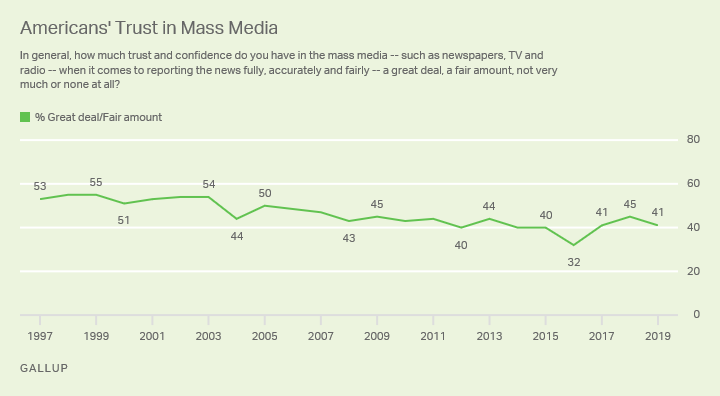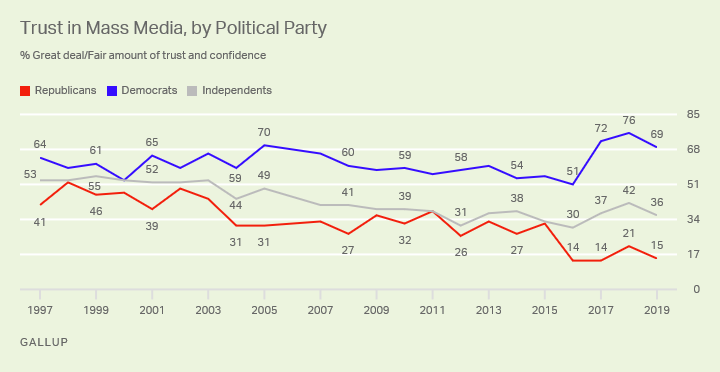Here Are Your Numbers
(Well, the class is on a bit of a public opinion bender. I mean, that's the current unit after all.)
A recent Gallup poll has found that American public opinion on the trustworthiness of Mass Media (things like news meant for mass consumption) has taken a dip over the past year, casting some doubt over the steady recovery since 2016. Of course, 2016 saw an extremely contentious presidential race, with rhetoric being slung around about the "fake news media," so it's not like that dip to 32% was unexpected. However, what could be causing this most recent dip?
Mass Media informs a lot of the actions voters and politicians take, providing an easy avenue for keeping citizens up to date on current events and potential policy and subtly spinning public opinion of policy issues. I find this trend of decline in public trust in mass media somewhat concerning. On one hand, mass media has never been perfect, but I find it hard to believe that it's been "deteriorating" as a decline like this would suggest. I believe the American citizen has just become gradually more cynical about the reliability of mass media news; whether or not that's warranted, I don't think I'd be qualified to say (a.k.a. I have no idea).
On the other hand, I'm also concerned about what this distrust means for voter behavior in the processes of American government. We'd prefer an informed citizen, and Mass Media is one of the most successful ways to get relevant information out to the voter base. If this many people think Mass Media news is fundamentally untrustworthy, I'm not sure if this would create a healthy amount of skepticism or if it would cause the average American to be uninformed for the fear of being misinformed. My hopes are on the former.
Questions:
1. What could possibly be causing a dip in Americans' trust in Mass Media in 2019?
2. This is the party split data on the issue:
Fascinating. Even before 2016 when Trump pressed the "fake news" narrative, Republicans seemed to trust mass media much less than Democrats, and Independents run in between the two. What could be the cause of this discrepancy between parties? What could this mean for how these voter bases behave in political processes like elections?
3. Could this distrust perhaps be healthy for America, and in what ways? In what ways would it be unhealthy?
Question for my sake: Where would you get your information on current events and potential policy if not from Mass Media?
Subscribe to:
Post Comments (Atom)


7 comments:
There are a few reasons not to trust Mass Media. Many forms of it don't have regular subscribers, so they write pieces to make them eye-catching and get ad Revenue (yellow journalism, if you will). Some people distrust media they don't agree with, so anything leaning left or right can be distrusted by the opposite side. Both of those phenomena have increased in recent years, amplifying the criticism. People also see Mass Media as a mouthpiece for authority, and trust in authority is on the decline as well. People shy away from biased sources but also find purely educational ones boring. It's difficult for reporting to be objective because hard facts don't lie, but interpretations of hard facts are always done by human beings, and unfortunately for us, human beings have emotional responses that trickle into our writing.
Natalie makes a great point about how articles that are either too biased or too factual become unappealing to readers. It really is hard to appeal to both categories and political parties to create a balanced article. Like Natalie said, it's hard to be impartial, meaning that mass media often has significant personal input from the writers. What I've noticed (which may be totally biased due to personal interest) is that there are a lot more well-known left leaning or center news sources than there are popular right news sources. With the popularity discrepancy comes an imbalance in the type of news stories being presented to the general public; the stories are more likely to be infused with liberal ideas than conservative viewpoints. A lot of the news sources may not satisfy what Republicans want to hear, thus leading to a distrust of what the news sources are reporting and the downturn in the graph Janet presents in question 2.
This probably doesn't apply to all of the people that participated in the first Gallup poll above, but I think it's possible Americans might have come to distrust mass media more because of the growing intensity of political partisanship, kind of like what Natalie said. Most people seem to have a political party or stance that they identify with, and if they start to repeatedly see certain types of mass media that are written mostly by journalists with opposing political views (maybe something like how the New York Times is seen as more liberal), it's likely that they would be suspicious of the validity of the content being presented to them. If the recent drop in trust is caused by this reason or something similar, I cannot see any ways that this would be healthy for the country. Avoiding reports spun with political beliefs that the reader disagrees might mean they are avoiding more biased sources, which could be seen as healthy. However, it doesn't mean they will search for a more objective news source. Instead, these readers will probably find other sources that do agree with their political values, only narrowing their perspective on current events and possibly leading them to blindly put their trust into sources that may not even be accurate.
I believe that a large contribution in the distrust towards the media stems from the perceived current malicious nature of politics as a whole. The mindset that the opposing party is constantly trying to undermine your own with their own agenda, is something which drives polarization, and a lack of trust and paranoia is something that goes hand in hand with such a train of thought. It also doesn't help, like Natalie said, that yellow journalism is a seemingly common occurrence, and thus it's creating a very noticeable divide among the general public in who they see as reliable, usually depending on their own preconceived beliefs. The media and the public flow in and out with one another, and so as one continues to polarize, so does the other. We live in an era of distrust and paranoia. I think distrust in media can be healthy to a limited extent. Obviously people should be very wary of what they believe as far as the media goes, it's incredibly dangerous to indulge in false information. However, it's also unhealthy for the political climate as a whole if people openly reject facts in favor of their own political biases, as it will just lead to further party divide. I think there are two issues at play here, one within the media, which revolves around faulty journalism, and an arguably even more expansive issue within the general public, which is based in a misguidance of basic political discourse.
Polarization definitely plays a role in increasing public cynicism when it comes to mass media. The term “fake news” is being thrown around so much today, and while it’s important to keep the media accountable, a lot of people are simply labelling what they don’t agree with as “fake news.” People see what they want to see, and if a media source puts their beliefs into question, it’s easy to dismiss that source as “fake” or “biased”, fueling the cycle of media criticism. It’s hard for the media to ever win; if they remain unbiased and purely factual, as Natalie said, it’s boring. If a media source takes a stand on a controversial issue, they’re labelled as radical. While the media is definitely far from perfect, so is the public, and oftentimes the media is used as a punching bag for an uninformed or polarized society, which plays a role in this downward trend of trust in media.
The public wants to see exciting things in the news, but when they do it is labelled as radical, as Olivia has said. The thing is mass media tries to get the public's attention and in order to do that they need to be entertaining. The best way this happens: comedy shows. Most late night shows these days deal with real life news with a comedic twist to make it seem less horrible. Though comedy shows usually show the true situation, everyone does not get all the details because that would be labelled as boring. Because of the comedy that is created with displaying the news, it becomes labelled as untrustworthy. However the sources are confirmed to actually be honest. Therefore I think that the reason mass media is not trusted is because the American public wants to see what they believe and when they don't, it simply gets labelled as "fake news".
The rise in distrust of mass media could be attributed to the exaggeration of news events for the purpose of entertainment. People hide details to appeal to an audience and show facts that they perceive as more important. More specifically, politicians can shape media coverage by telling stories that appeal most to their own political views and beliefs. Republicans might be more distrusting of the media than both Democrats and Independents because they only trust news in support of their own political beliefs.
Post a Comment